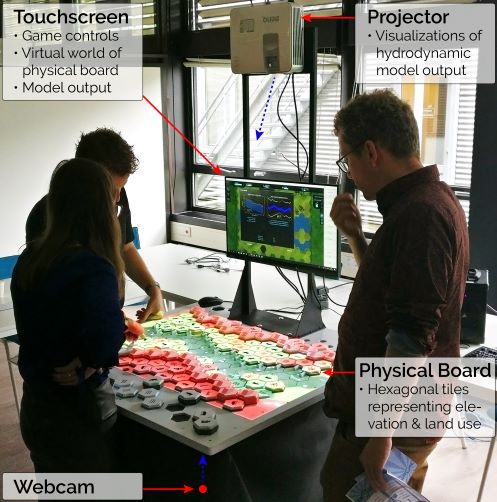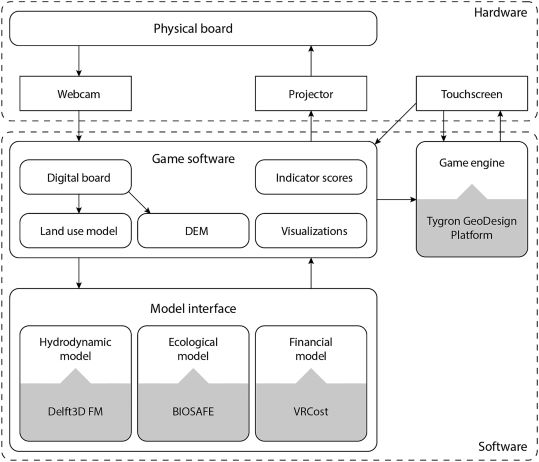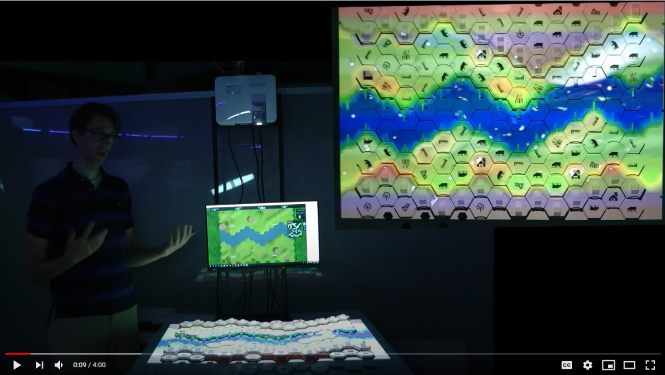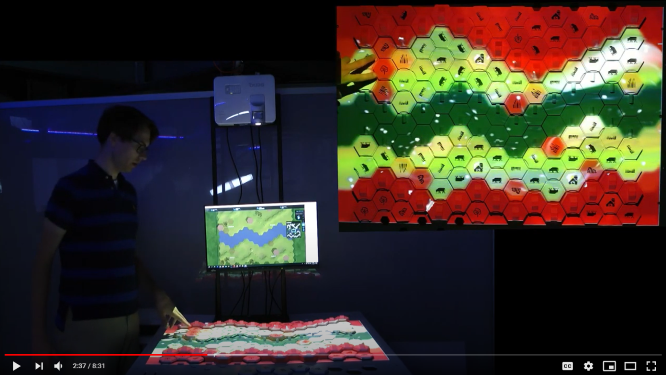Tygron for Scientific Research: Difference between revisions
No edit summary |
|||
| Line 3: | Line 3: | ||
A PhD candidate at the University of Twente was assigned to create a serious gaming environment for river interventions as a tool that facilitates stakeholder engagement. The research was one among 20 projects as part of the [https://kbase.ncr-web.org/rivercare/projects-overview/ RiverCare research program]. The researcher is a human-centered interface designer, and is not an expert in river interventions. After developing and testing several prototypes, the researcher created the the virtual river game, a unique board-game that is digitally connected to the Tygron platform. To simulate river interventions, players can move the pieces on the board, and immediately see the changes on the Tygron screen including the new map, as well as numerical calculations and graphs. | A PhD candidate at the University of Twente was assigned to create a serious gaming environment for river interventions as a tool that facilitates stakeholder engagement. The research was one among 20 projects as part of the [https://kbase.ncr-web.org/rivercare/projects-overview/ RiverCare research program]. The researcher is a human-centered interface designer, and is not an expert in river interventions. After developing and testing several prototypes, the researcher created the the virtual river game, a unique board-game that is digitally connected to the Tygron platform. To simulate river interventions, players can move the pieces on the board, and immediately see the changes on the Tygron screen including the new map, as well as numerical calculations and graphs. | ||
[[File:virtualriver3.png|frame|center|The game board of the Virtual River game]] | |||
==Content of the Research== | ==Content of the Research== | ||
Revision as of 15:14, 10 March 2021
Use-case 4: “the Virtual River Game”
This page of the manual is still under development. The final version will be launched on April 8th 2021 during the EDU event 2021.
A PhD candidate at the University of Twente was assigned to create a serious gaming environment for river interventions as a tool that facilitates stakeholder engagement. The research was one among 20 projects as part of the RiverCare research program. The researcher is a human-centered interface designer, and is not an expert in river interventions. After developing and testing several prototypes, the researcher created the the virtual river game, a unique board-game that is digitally connected to the Tygron platform. To simulate river interventions, players can move the pieces on the board, and immediately see the changes on the Tygron screen including the new map, as well as numerical calculations and graphs.
Content of the Research
General information
- The PhD Position:"A serious gaming environment for river interventions"
- Main Researcher:"Robert-Jan den Haan"
- Research Programme: RiverCare
- Department: Department of Design, Production & Management
- Educational Institute: Faculty of Engineering Technology of the University of Twente
- Involved Organisations: Rijkswaterstaat, Deltares, Witteveen+Bos, Arcadis, HKV, T-Xchange, TWO & Tygron Geodesign Platform
Objectives and desired outcome
The main objective of the research is to create a virtual game that allows players to interact with an imaginary river section.
The game would allow different stakeholder groups to:
- learn about each others' perspectives regarding river management
- take better decisions of river interventions
- reflect upon the potential effects of those interventions
To do that, the researcher is expected to develop and test a serious virtual game where players experience how river systems function.
Research process
Time distribution
Resources
Using Tygron
API (Application Programmers Interface)
Outcome of the research
You can find the full research paper here: The Virtual River Game: Gaming using models to collaboratively explore river management complexity
You can find the summary poster of the project here: File:Summary poster - virtual river game.pdf
Feedback and recommendations
Contact
For more information about this PhD research, you can contact us at: info@Tygron.com
You can also contact Robert-Jan den Haan, researcher at the University of Twente at: r.j.denhaan@utwente.nl
| <<Previous page | Next page>> |




